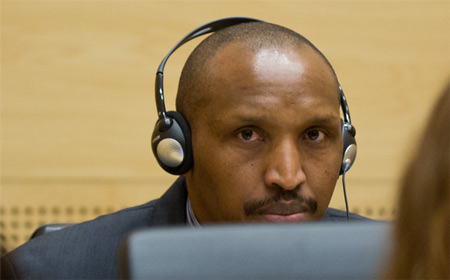Ntaganda “persecuted civilians on ethnic grounds, through deliberate attacks, forced displacement, murder, rape, sexual enslavement and pillaging,” Chief Prosecutor Fatou Bensouda told pre-trial judges in The Hague.
After the hearings, the judges will decide whether or not to confirm the charges against the former warlod.
Rwandan-born Ntaganda became a general in the Congolese army as part of a peace deal signed between the government and CNDP rebels in 2009.
He had previously fought in the Rwandan army before becoming a commander in the Patriotic Forces for the Liberation of Congo militia operating in northeastern Congo and led by Thomas Lubanga.
The ICC first indicted Ntaganda in 2006, becoming one of its most wanted fugitives. New charges were added in 2012.
Prosecutors say that between 2002 and 2003, Ntaganda’s UPC/FPLC forces “encircled the towns and villages of the Lendu and other non-Hema tribes, shelled them, and then ethnically cleansed the areas by killing and raping civilians, forcing their displacement to the surrounding forests and eventually looting their property.”
Ntaganda has been charged with thirteen counts of war crimes and five counts of crimes against humanity.
The war crimes charges against him include the use of “child soldiers, pillaging, displacement of civilians, conscription of children under the age of 15, enlistment of children under the age of 15, use of children under the age of 15 to participate actively in hostilities.”
The crimes against humanity charges against him include “murder and attempted murder of civilians, rape of civilians, sexual slavery of civilians, persecution on ethnic grounds, and forcible transfer of population.”
Nicknamed the Terminator by his victims in the Ituri region in Orientale Province, he turned himself to the United States embassy in Kigali, Rwanda, on March 22, 2013, fleeing infighting in the M23 rebel group that former CNDP rebels formed in 2012 after the Congolese government decided to arrest Ntaganda.
Related articles
- • DRC and Rwanda Sign Declaration of Principles for Peace in Eastern Congo (April 25, 2025)
- • European Union Sanctions Rwanda and M23 Officials over Congo Conflict (March 17, 2025)
- • Canada and Germany Impose Sanctions on Rwanda for Supporting M23 Rebels (March 4, 2025)
- • UK Suspends Financial Aid to Rwanda Over M23 Rebellion (February 25, 2025)
- • European Union Suspends Defence Consultations with Rwanda (February 24, 2025)
- • Tshisekedi Announces Government of National Unity and Calls for Unity Against M23 Rebels (February 23, 2025)
- • UN Security Council Calls on Rwanda to Stop Supporting M23 Rebels in DR Congo (February 22, 2025)
- • US Sanctions Rwanda's Minister James Kabarebe for Central Role in DR Congo Conflict (February 20, 2025)
- • Rwanda-Backed M23 Rebels Summarily Executed Children in Bukavu, UN Reports (February 19, 2025)
- • DR Congo Citizens Head to Polls to Elect President, Members of Parliament (December 20, 2023)
- • 'Deadly environment' plus 'political and social' obstacles hinder Ebola fight, Security Council hears (July 24, 2019)
- • Ebola outbreak declared an international Public Health Emergency (July 17, 2019)
- • At least 30 dead after massacres in Ituri (March 2, 2018)
- • No elections in DR Congo in December without electronic voting machines: INEC (February 13, 2018)
- • US Warns DR Congo Against Electronic Voting for Delayed Election (February 12, 2018)
- • Peacekeepers, Congo Army to Resume Joint Fight Against Rwandan Rebels (January 28, 2016)
- • Political tensions 'running high' in DR Congo ahead of 2016 elections (October 7, 2015)
- • DRC Army Putting Pressure on FDLR (April 1, 2015)
- • ICC Confirms 14-Year Sentence Against Thomas Lubanga (December 1, 2014)
- • ICC confirms war crimes charges against Bosco Ntaganda (June 10, 2014)
- • ICC sentences Germain Katanga to 12 years (May 23, 2014)
- • Kerry Calls on Kabila to Honor Constitution (May 4, 2014)
- • Kerry in DR Congo for Security Talks (May 3, 2014)
- • U.S. sending more personnel to Uganda to hunt LRA leader Joseph Kony (March 24, 2014)
- • ICC finds Germain Katanga guilty of war crimes and crime against humanity (March 7, 2014)
- • New DR Congo amnesty law welcomed by UN envoys (February 5, 2014)
- • Colonel Mamadou Ndala Is Killed in Ambush (January 2, 2014)
- • DR Congo, M23 Rebels Sign Declarations Marking End of Kampala Peace Talks (December 12, 2013)
- • No 'Peace Deal' With Defeated M23 Rebels, DR Congo Says (November 11, 2013)
- • Congo Will Not Sign a 'Peace Deal' With Defeated M23 Rebels, Government Says (November 6, 2013)
Tags: |








